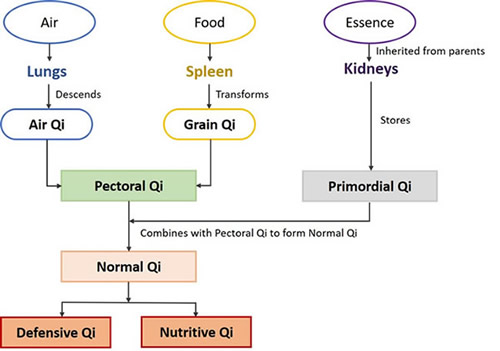Fundamental Substances
Qi, Blood, Body Fluid and Essence are fundamental substances of the human body which sustain the normal physiological functions of Zang Fu organ systems.
Qi
The word Qi means the vital energy or life force that circulates in the body through a system of pathways called meridians. A person’s health is influenced by the quality, quantity and balance of Qi. All TCM procedures, including acupuncture and Chinese herbs, are intended to maintain the quality and quantity of Qi and to regulate the flow of Qi.
Qi has different names depending on its sources, roles, and locations. It is a refined substance inherited from our parents (Primordial Qi) and constantly replenished by the internal organs (Pectoral Qi), utilizing Qi from the clean air (Air Qi) and food (Grain Qi). Generally, Qi refers "Normal Qi", which is a combination of Primordial Qi and Pectoral Qi. Qi (Normal Qi) is divided into "Defensive Qi" and "Nutritive Qi". Nutritive Qi generates Blood and nourishes the body, mind and spirit. Defensive Qi defends the body against invasions of external pathogens.

Qi can also be classified based on the organ or meridian where it resides. Qi is a core constituent of each Zang Fu organ and it enables proper functioning of the organs. It is present in all Zang Fu organs and named after the organ where it resides: Liver Qi, Spleen Qi, etc. Each meridian has its own Qi for their normal function as well. Qi in both the organs and meridians is always derived from Pectoral Qi. It gets continuously replenished throughout one's life.
Fuctions of Qi
- Promoting: Qi promotes the essential functions of organs and meridians in the human body. If Qi is deficient, it will negatively affect the functional entities and vital substances, leading to illness
- Warming: Qi helps produce heat and regulates body temperature for normal functions to occur. A deficiency in Qi can cause a lowered body temperature and cold limbs.
- Defending: Qi defends the body against external pathogens that can cause illness. Weakness in Qi results in low immunity.
- Holding: Qi keeps that the organs, Blood, and Body fluids in their proper places. Qi deficiency can cause easy bruising or organ collapse.
- Transforming: Qi transforms nutrition and air into different forms of Qi and different substances, such as Blood and Body Fluids.
Blood (Xue)
In TCM, the Blood is transformed from the essence of food via the digestion and absorption of the Spleen and the Stomach. The Blood circulates throughout the body to nourish and moisten the organ systems to maintain their normal functions.
The Blood is also related to the mental health, since the Heart Blood houses the Shen (mind); the Blood is the substantial basis for mental activities. Only when there is abundant Qi and Blood, there can be high spirits and clear minds. Pathological changes of the Blood can cause symptoms, such as palpitation, insomnia, unconsciousness, and delirium.
Body Fluid (Jin Ye)
Body fluid in TCM is a general term for all normal liquid in the body, including saliva, gastric fluid, intestinal fluid, joint cavity fluid, tears, nasal discharge, sweat, urine, etc.
Body fluid is derived from food and drink, which are digested and absorbed by the Spleen and the Stomach. It exists in the blood, tissues, and interstices of joints. Jin, a lucid and thin fluid, warms and nourishes the muscles and moistens the skin. Ye, a turbid and viscous fluid, lubricates the joints, tones the brain, and moistens the orifices.
Essence (Jing)
Essence is the refined and precious substance that is the material basis for all life. Essence is stored in the Kidneys and circulates throughout the body, primarily via the eight Extra-ordinary meridians.
It influences our constitution, reproduction, growth and development, and our longevity. It is the foundation for Qi, Blood, and Marrow.
NOTE: The names of organs are capitalized when referring to the entire, functional organ systems in TCM perspective: Liver, Blood, etc. The names of organs are lower-cased when referring to the distinct, biomedical organs: liver, blood, etc.